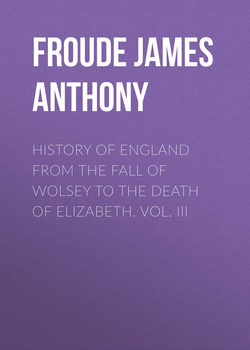History of England from the Fall of Wolsey to the Death of Elizabeth. Vol. III

Реклама. ООО «ЛитРес», ИНН: 7719571260.
Оглавление
Froude James Anthony. History of England from the Fall of Wolsey to the Death of Elizabeth. Vol. III
CHAPTER XII. FOREIGN AND DOMESTIC ASPECTS OF THE REFORMATION IN ENGLAND
CHAPTER XIII. THE PILGRIMAGE OF GRACE
CHAPTER XIV. THE COMMISSION OF CARDINAL POLE
CHAPTER XV. THE EXETER CONSPIRACY
CHAPTER XVI. THE SIX ARTICLES
CHAPTER XVII. ANNE OF CLEVES, AND THE FALL OF CROMWELL
Отрывок из книги
The Nun of Kent’s conspiracy, the recent humour of convocation, the menaces of Reginald Pole, alike revealed a dangerous feeling in the country. A religious revolution in the midst of an armed population intensely interested in the event, could not be accomplished without an appeal being made at some period of its course to arms; and religion was at this time but one out of many elements of confusion. Society, within and without, from the heart of its creed to its outward organization, was passing through a transition, and the records of the Pilgrimage of Grace cast their light far down into the structure and inmost constitution of English life.
The organic changes introduced by the parliament of 1529 had been the work of the king and the second house in the legislature; and the peers had not only seen measures pass into law which they would gladly have rejected had they dared, but their supremacy was slipping away from them; the Commons, who in times past had confined themselves to voting supplies and passing without inquiry such measures as were sent down to them, had started suddenly into new proportions, and had taken upon themselves to discuss questions sacred hitherto to convocation. The upper house had been treated in disputes which had arisen with significant disrespect; ancient and honoured customs had been discontinued among them against their desire;80 and, constitutionally averse to change, they were hurried powerless along by a force which was bearing them they knew not where. Hating heretics with true English conservatism, they found men who but a few years before would have been in the dungeons of Lollards’ Tower, now high in court favour, high in office, and with seats in their own body. They had learnt to endure the presence of self-raised men when as ecclesiastics such men represented the respectable dignity of the Church; but the proud English nobles had now for the first time to tolerate the society and submit to the dictation of a lay peer who had been a tradesman’s orphan and a homeless vagabond. The Reformation in their minds was associated with the exaltation of base blood, the levelling of ranks, the breaking down the old rule and order of the land. Eager to check so dangerous a movement, they had listened, some of them, to the revelations of the Nun. Fifteen great men and lords, Lord Darcy stated, had confederated secretly to force the government to change their policy;81 and Darcy himself had been in communication for the same purpose with the Spanish ambassador, and was of course made aware of the intended invasion in the preceding winter.82 The discontent extended to the county families, who shared or imitated the prejudices of their feudal leaders; and these families had again their peculiar grievances. On the suppression of the abbeys the peers obtained grants, or expected to obtain them, from the forfeited estates. The country gentlemen saw only the desecration of the familiar scenes of their daily life, the violation of the tombs of their ancestors, and the buildings themselves, the beauty of which was the admiration of foreigners who visited England, reduced to ruins.83 The abbots had been their personal friends, “the trustees for their children and the executors of their wills;”84 the monks had been the teachers of their children; the free tables and free lodgings in these houses had made them attractive and convenient places of resort in distant journeys; and in remote districts the trade of the neighbourhood, from the wholesale purchases of the corn-dealer to the huckstering of the wandering pedlar, had been mainly carried on within their walls.85
.....
As he rode down at midnight to the bank of the Humber, the clash of the alarm-bells came pealing far over the water. From hill to hill, from church-tower to church-tower, the warning lights were shooting. The fishermen on the German Ocean watched them flickering in the darkness from Spurnhead to Scarborough, from Scarborough to Berwick-upon-Tweed. They streamed westward, over the long marshes across Spalding Moor; up the Ouse and the Wharf, to the watershed where the rivers flow into the Irish Sea. The mountains of Westmoreland sent on the message to Kendal, to Cockermouth, to Penrith, to Carlisle; and for days and nights there was one loud storm of bells and blaze of beacons from the Trent to the Cheviot Hills.
All Yorkshire was in movement. Strangely, too, as Aske assures us, he found himself the object of an unsought distinction. His own name was the watchword which every tongue was crying. In his absence an address had gone out around the towns, had been hung on church-doors, and posted on market crosses, which bore his signature, though, as he protested, it was neither written by himself nor with his consent.122 Ill composed, but with a rugged eloquence, it called upon all good Englishmen to make a stand for the Church of Christ, which wicked men were destroying, for the commonwealth of the realm, and for their own livings, which were stolen from them by impositions. For those who would join it should be well; those who refused to join, or dared to resist, should be under Christ’s curse, and be held guilty of all the Christian blood which should be shed.
.....